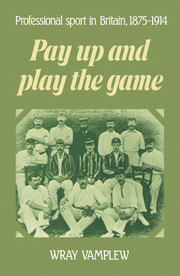Book contents
- Frontmatter
- Contents
- List of tables
- Preface
- Acknowledgements
- A guide to prices, 1870–1914
- Part I An overview
- Part II The development of professional gate-money sport
- Part III Sport in the market place: the economics of professional sport
- Part IV Playing for pay: professional sport as an occupation
- 12 The struggle for recognition
- 13 Earnings and opportunities
- 14 Close of play
- 15 Not playing the game: unionism and strikes
- 16 Labour aristocrats or wage slaves?
- Part V Unsporting behaviour
- Part VI A second overview
- Appendices
- Notes
- Bibliography
- Index
15 - Not playing the game: unionism and strikes
Published online by Cambridge University Press: 16 February 2010
- Frontmatter
- Contents
- List of tables
- Preface
- Acknowledgements
- A guide to prices, 1870–1914
- Part I An overview
- Part II The development of professional gate-money sport
- Part III Sport in the market place: the economics of professional sport
- Part IV Playing for pay: professional sport as an occupation
- 12 The struggle for recognition
- 13 Earnings and opportunities
- 14 Close of play
- 15 Not playing the game: unionism and strikes
- 16 Labour aristocrats or wage slaves?
- Part V Unsporting behaviour
- Part VI A second overview
- Appendices
- Notes
- Bibliography
- Index
Summary
Power relationships in commercialised sport were skewed against the professionals. Admittedly some top-class jockeys found that they held the reins, partly because they were frequently proved right in their choice of race tactics, but also because ‘the supply of men between 7 stones and 8 stones possessed of the needful skill and experience [was] extremely limited, and [so] people think it diplomatic in consequence to put up with this, that and the other’. These men could always find employment with a rival owner and hence their peccadillos were often tolerated by employers who would not have accepted similar behaviour from others in their pay. Generally, however, the pendulum of sports power swung towards the employers, men whose notions of industrial relations were dominated by paternalism: employees would be looked after if they behaved themselves and they should be grateful for what they were given.
Clubs could be ‘good’ to their players. The provision of leisure facilities at the ground, winter employment, excursions, and the payment of doctors' and hospital bills, often in excess of what a player obtained in wages, all testify to that. Individual examples of club generosity include Sheffield Wednesday sending the injured Robertson, accompanied by his wife, to the seaside to recuperate; Leicestershire doing the same for the consumptive Jayes and later paying for his sojourn in a Swiss sanitorium; and Lancashire financing the long-serving Richard Pilling's journey to Australia in an attempt to beat the respiratory affliction which eventually killed him.
- Type
- Chapter
- Information
- Pay Up and Play the GameProfessional Sport in Britain, 1875–1914, pp. 239 - 253Publisher: Cambridge University PressPrint publication year: 1988



